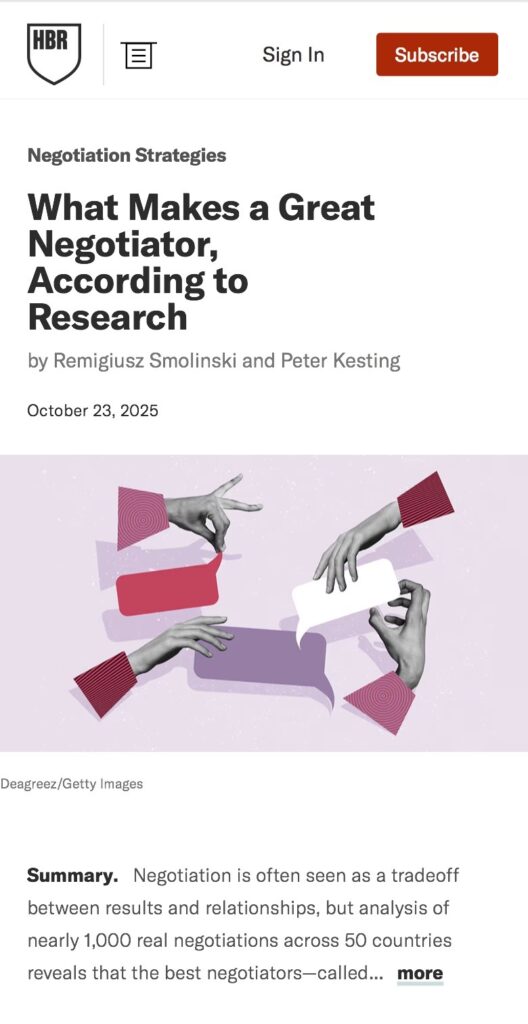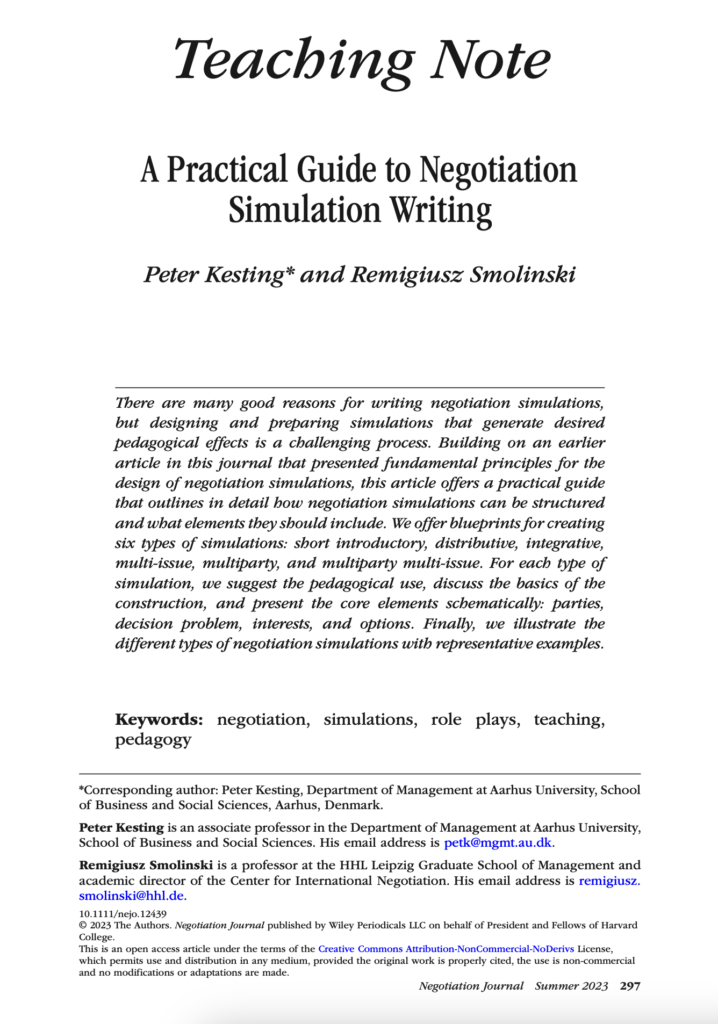For nearly 20 years, Peter Kesting and I have observed thousands of negotiations conducted by some of the brightest negotiators on the planet. We’re thrilled that our findings are now out in Harvard Business Review in an article titled “What Makes a Great Negotiator, According to Research.” This post shares the core ideas behind the piece plus a few personal reflections on why they matter for leaders, teams, and organizations.
Our research draws on almost 1,000 documented negotiations from The Negotiation Challenge (TNC), a global competition we’ve run for years with meticulously designed scenarios, structured scoring, and expert judging. Each negotiation produces both substantive outcomes (what was achieved) and relational outcomes (trust, credibility, working climate). This dual lens lets us test a long-standing assumption in our field.
The traditional view says negotiators must choose: push hard for results or play it soft to preserve the relationship. Our data doesn’t support that. The best negotiators consistently achieve both strong outcomes and trust. In other words: great negotiation isn’t about temperament; it’s about competence.
We saw top performers who were quiet and reflective; others were energetic and highly expressive. Style varied widely. What didn’t vary among the best was skill—the ability to read the room, manage emotion, frame issues clearly, and sequence moves that create value while safeguarding credibility.
Great negotiators balance assertiveness with empathy, knowing when to compete, when to cooperate, and how to blend both without losing trust. They stay flexible, adapting strategy as new information emerges rather than clinging to a script. They make their thinking visible by structuring the conversation, naming issues, surfacing interests, and proposing options so progress is trackable. Throughout, they protect the relationship while creating value, separating people from problems without separating people from respect.
Across cases, four higher-order competencies predicted excellence:
- Language and Emotionality – Clear framing, precise language, and emotional self-regulation. These negotiators can put complex issues into simple words and keep the temperature of the conversation productive.
- Negotiation Intelligence – Strategic sense-making: diagnosing the situation, mapping interests, and choosing tactics that fit the context. It’s the ability to combine analysis with timing.
- Relationship Building – Trust is not an afterthought. Top performers invest in credibility, follow-through, and psychological safety—because those are the preconditions for creating value.
- Moral Wisdom – Empathy-guided ethical clarity and fairness instincts; these negotiators protect long-term reputation and avoid short-term wins that poison future cooperation.
Even among exceptionally capable participants, only about 5% consistently achieved both strong substantive and relational outcomes. “Integrated achievers” are rare—and that rarity is instructive. Excellence is not a personality trait; it’s the result of deliberate practice, feedback, and measurement.
Measurement matters! If we don’t assess how we negotiate, as individuals, teams, and organizations, we limit learning and progress. Use clear rubrics to define what “good” looks like, combine metrics that capture both results and relationships, and track performance repeatedly over time rather than relying on one-off scores.
For leaders and their organizations, the evidence suggests treating negotiation as a core leadership discipline, one that can be measured, taught, and improved. It may be valuable to invest in capability building around the four meta-competencies and to emphasize structured, feedback-driven practice. Incentives could be aligned to recognize outcomes that create value and sustain relationships, and it can be helpful to cultivate a “data habit” by regularly capturing negotiation performance across projects, suppliers, and internal talks to inform coaching and continuous improvement.
Writing the HBR piece reminded me how persistent the false binary remains: “win the deal” versus “protect the relationship.” Our evidence shows you can do both and the best do. It also reinforced how rare integrated excellence is. That rarity, however, is an invitation: with the right practice and measurement, more negotiators can join that 5%. Finally, the work reaffirmed a simple truth: progress requires feedback. Without structured assessment, we’re left with anecdotes and overconfidence.
This project would not exist without the vibrant community around The Negotiation Challenge: the participants who put their skills to the test, the judges who generously share their expertise, and the scholars and practitioners who have debated, challenged, and refined these ideas with us over the years.
Thank you!
Source: What Makes a Great Negotiator, According to Research




